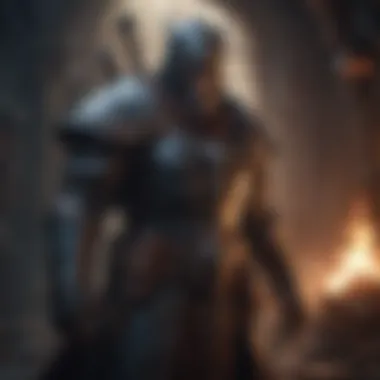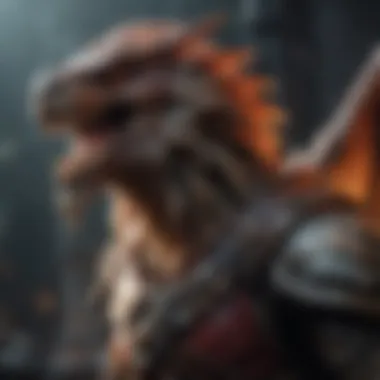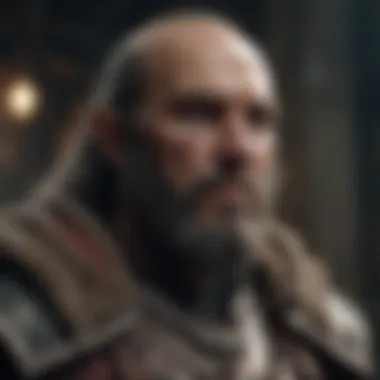Unravelling the Intriguing Dynamics Between Heroes and Villains in Dungeons and Dragons


This feature embarks on an in-depth exploration of the ever-fascinating dynamics between the stalwart heroes and cunning villains in the expansive realm of Dungeons and Dragons. Delving into the intricate interplay of light and darkness, courage and malevolence, we unravel the essence of storytelling and gameplay within this captivating universe.
Games News
In the realm of gaming, where innovation and excitement converge, the latest updates are crucial to staying ahead of the curve. From groundbreaking revelations to significant industry revolutions, keeping abreast of the breaking stories ensures a comprehensive grasp of the gaming landscape. Amidst the digital realm's ever-evolving trends, highlighting the most current news in the gaming sphere provides enthusiasts and professionals alike with a pulse on the dynamic world of interactive entertainment.
Unique Features
Within the immersive tapestry of gaming, unique features shine a spotlight on hidden gems and unsung heroes. Game spotlights offer a platform to showcase lesser-known titles that exude creativity and innovation, enriching the gaming experience for connoisseurs seeking fresh adventures. Additionally, delving into developer insights provides a behind-the-scenes glimpse into the intricate craftsmanship and passion driving the gaming industry forward. From event coverage illuminating the pulsating energy of gaming expos to the nuanced narratives woven by game developers, each unique feature adds layers of depth and appreciation to the gaming realm.
Introduction
In the vast expanse of Dungeons and Dragons, the dynamics of heroes and villains stand as pillars shaping narratives and gameplay. This article aims to unravel the intricate interplay between valor and malevolence, shedding light on how these characters drive the essence of storytelling within the D&D universe. As players delve into realms teeming with adversities and triumphs, understanding the essence of heroes and villains becomes paramount for fully immersing oneself in the captivating world of Dungeons and Dragons.
The Concept of Heroes and Villains
Defining Heroic Archetypes
Delving into the realm of Defining Heroic Archetypes is like deciphering the blueprint of valor itself. These archetypes serve as the fundamental pillars on which heroic characters are built, embodying ideals of courage, honor, and selflessness. Exploring the essence of Defining Heroic Archetypes equips players and storytellers with a roadmap to create characters that resonate with themes of heroism, inspiring players to embody noble virtues within their gameplay experiences.
Unveiling the Nature of Villainy
As shadows embrace malevolence, the Nature of Villainy reveals itself as a force driven by nefarious intent and twisted motives. Villains in Dungeons and Dragons embody the darker aspects of storytelling, challenging heroes and pushing the boundaries of morality. Unveiling the intricacies of Villainy adds layers of depth to narratives, sparking conflict and tension that elevate the gameplay experience to new heights.
Significance in Dungeons and Dragons
Impact on Gameplay Dynamics
Within the realm of Dungeons and Dragons, heroes and villains act as linchpins shaping Gameplay Dynamics. The choices and actions of players reverberate through the narrative, influencing the outcome of encounters and quests. Understanding how heroes and villains influence Gameplay Dynamics empowers players to navigate moral dilemmas and strategic decisions, adding layers of complexity to their gaming experiences.
Role in Immersive Narratives


In the tapestry of Immersive Narratives, heroes and villains paint contrasting hues that enrich the storytelling experience. Heroes emerge as beacons of hope, driving the narrative forward with their quests for justice, while villains weave intricate plots that test the resilience of protagonists. Recognizing the integral Role that heroes and villains play in Immersive Narratives allows players to engage deeply with the story, immersing themselves in a world where every choice has far-reaching consequences.
Heroes in Dungeons and Dragons
Heroes in Dungeons and Dragons play a crucial role in shaping the narrative and driving the gameplay forward. These valiant champions embody virtues such as courage, honor, and altruism, standing as beacons of hope in a world fraught with darkness and danger. By exploring the concept of heroes in Dungeons and Dragons, we unravel the intricate dynamics that fuel engaging storylines and provide players with a sense of purpose and direction. Valor and virtue are not just mere constructs in this realm; they form the very essence of what it means to be a hero, inspiring players to embody these qualities in their characters and actions.
Valor and Virtue
In the realm of Dungeons and Dragons, valor and virtue are embodied by different character classes, each bringing their unique strengths and abilities to the table. Paladins: Guardians of Justice exemplify unwavering moral code and divine righteousness, often seen as the champions of the weak and the protectors of the innocent. Their ability to smite evil and heal allies makes them a popular choice for players seeking both combat prowess and righteous purpose. Warriors: Masters of Combat are the epitome of martial skill and battlefield expertise, wielding their weapons with precision and strength. While they may not possess magical powers like other classes, their resilience and physical prowess make them indispensable in any adventuring party.
Paladins: Guardians of Justice
Paladins stand out as stalwart defenders of justice and righteousness in the Dungeons and Dragons universe. Their unique ability to channel divine energy and detect evil makes them invaluable assets in any quest for truth and honor. A key characteristic of Paladins is their unwavering commitment to their cause, willing to make great sacrifices in the name of justice. This class brings a blend of combat proficiency and spellcasting, allowing players to engage in both physical battles and spiritual warfare effectively.
Warriors: Masters of Combat
Warriors are revered for their mastery of martial techniques and their unwavering courage on the battlefield. Their key characteristic lies in their unparalleled skill with weapons and armor, making them the frontline leaders in any conflict. While lacking the magical abilities of spellcasters, Warriors make up for it with sheer martial prowess and the ability to withstand blows that would fell lesser foes. Their straightforward approach to combat ensures that they excel in delivering and absorbing damage, making them vital assets in any adventuring party.
Behind the Mask of Heroism
Beyond the dazzling displays of valor and bravery, heroes in Dungeons and Dragons also face inner struggles and personal sacrifices that define their characters and journey. Struggles and Sacrifices shed light on the hardships heroes endure, from loss and failure to moral dilemmas that test their resolve. Understanding these challenges adds depth and complexity to hero portrayals, showcasing the human side behind the facade of mythical bravery. Evolution of Heroic Characters emphasizes the growth and development heroes experience throughout their adventures, transitioning from mere beginners to legendary figures renowned for their deeds and decisions.
Struggles and Sacrifices
Heroes often face immense challenges and personal sacrifices in their pursuit of justice and righteousness. The key characteristic of Struggles and Sacrifices lies in the moral and emotional turmoil heroes undergo when confronted with difficult choices and heartbreaking losses. These trials forge their characters, shaping them into individuals capable of great compassion and resilience. While the path of a hero may be laden with hardships, it is through these struggles that their true essence is revealed, inspiring both their allies and adversaries.
Evolution of Heroic Characters
The evolution of hero characters in Dungeons and Dragons is a testament to personal growth and transformation. Heroes start their journey as humble adventurers, with little more than raw talent and ambition propelling them forward. However, as they face trials and overcome obstacles, they mature and evolve, gaining experience, wisdom, and battle scars that shape their identities. The unique feature of the evolution of heroic characters lies in the gradual progression from naive novices to seasoned veterans, each step marking a milestone in their development and contributing to the richness of their tale.
Villains in Dungeons and Dragons


In the intricate realm of Dungeons and Dragons, villains play a crucial role in shaping the narrative landscape. These antagonists add depth and complexity to the gameplay, driving the storyline forward with their malevolent intentions and cunning schemes. The presence of villains in Dungeons and Dragons is essential for creating dynamic conflicts, challenging the heroic characters, and testing the players' strategic abilities. Villains serve as formidable adversaries, pushing the boundaries of conventional morality and adding a layer of intrigue to the gaming experience.
Shadows of Malevolence
Dark Lords and Tyrants
Dark Lords and Tyrants embody the epitome of evil within the Dungeons and Dragons universe. These powerful figures command fear and awe, ruling over dark domains with iron fists. Their compelling presence instills dread in both characters and players, creating a sense of urgency and danger within the game world. The key characteristic of Dark Lords and Tyrants lies in their insatiable thirst for power and control, driving them to extreme lengths to achieve their nefarious goals. The allure of playing a Dark Lord or Tyrant lies in the opportunity to explore the depths of villainy, showcasing a darker shade of morality that challenges players' perceptions and strategies.
Cunning Tricksters and Deceivers
In contrast to the brute force of Dark Lords, Cunning Tricksters and Deceivers rely on wit and deception to achieve their malevolent ends. These villainous characters thrive on manipulation and subterfuge, engaging in intricate schemes to outwit their adversaries. The key characteristic of Cunning Tricksters and Deceivers is their ability to unravel the best-laid plans through cunning stratagems and clever ruses. Choosing to embody a Cunning Trickster in Dungeons and Dragons offers players a unique gameplay experience, requiring finesse, intellect, and adaptability to outmaneuver their foes and achieve their sinister objectives.
Motivations and Machinations
Quest for Power and Domination
The Quest for Power and Domination represents a common motive among villains in Dungeons and Dragons, driving them to seek ultimate supremacy and control. This relentless pursuit of power fuels their actions, leading to grand ambitions and sweeping conquests. The key characteristic of characters on this quest is their unwavering determination to rise above all adversaries and assert their dominance. Embracing the Quest for Power and Domination as a core theme in gameplay introduces a thrilling dynamic, pitting players against formidable foes who will stop at nothing to achieve their lofty ambitions.
Twisted Schemes and Plots
Twisted Schemes and Plots add an element of intrigue and mystery to the world of Dungeons and Dragons, keeping players on their toes with unexpected twists and turns. Villains who craft elaborate schemes challenge players to think outside the box, anticipate devious tactics, and navigate treacherous waters of deceit. The unique feature of Twisted Schemes and Plots lies in their ability to subvert conventional storytelling tropes, offering a fresh and engaging experience for players seeking intellectual stimulation and strategic gameplay. Engaging with characters driven by Twisted Schemes and Plots promises riveting encounters filled with suspense, betrayal, and high-stakes decision-making.
Dynamic Interactions
Dynamic interactions play a pivotal role in unraveling the depths of heroes and villains in the realm of Dungeons and Dragons. It is through these interactions that the essence of the narrative is truly brought to life, captivating and engaging players in a world where morality is not merely black and white. The nuances of these exchanges add layers of complexity to the gameplay, making each decision and action resonate deeply within the storyline. Dynamic interactions present gamers with the opportunity to explore the intricacies of moral dilemmas, ethical choices, and the ever-shifting balance between good and evil, enriching the gaming experience with thought-provoking scenarios. Within this article, the focus lays on delving into the interplay of light and darkness, valor and malevolence, highlighting how these dynamic interactions shape the fabric of Dungeons and Dragons adventures.
Clashes of Good and Evil
Epic Battles and Confrontations
Epic battles and confrontations stand as the pinnacle of dramatic gameplay in Dungeons and Dragons. These high-stakes encounters between heroes and villains not only showcase raw strength and strategy but also underline the fundamental clash between good and evil forces at play. The epic battles not only serve as thrilling moments for players but also drive the narrative forward, shaping the outcomes of the characters and the world they inhabit. Their significance lies in the adrenaline-fueled excitement they offer, as well as the opportunity for characters to prove their mettle and forge their destinies amidst the chaos of conflict in the story.


Psychological Warfare and Manipulations
On the contrasting end of the spectrum, psychological warfare and manipulations add a level of depth and intrigue to the interactions between heroes and villains. This aspect goes beyond mere physical confrontations and dives into the realm of mind games, subtle coercion, and strategic maneuvering. In this article, the exploration of psychological warfare and manipulations sheds light on the lengths to which characters will go to achieve their goals, the impact of mental fortitude and resilience in facing adversaries, and the blurred lines between heroism and villainy when tactics become morally ambiguous. The complexity of psychological warfare adds layers of suspense and uncertainty, challenging players to navigate treacherous waters of manipulation and deceit within the game's narrative fabric.
Narrative Depth and Complexity
Character Development and Redemption Arcs
Character development and redemption arcs are essential components in shaping the evolution of heroes and villains throughout Dungeons and Dragons adventures. These arcs contribute to the richness of storytelling, allowing characters to grow, learn from their experiences, and potentially seek redemption for past mistakes or misdeeds. The significance of character development lies in deepening the emotional engagement of players with the narrative, fostering empathy towards characters, and providing a sense of progression and growth within the game world. Redemption arcs, in particular, add layers of complexity by challenging traditional archetypes and exploring the possibility of transformation and second chances within the context of the story.
Intriguing Plot Twists and Turns
Intriguing plot twists and turns serve as the driving force behind keeping players on the edge of their seats, eagerly anticipating the next unexpected development in the storyline. These twists inject a sense of unpredictability and suspense into the narrative, allowing for moments of revelation, betrayal, and revelation that keep the gameplay experience fresh and exciting. The unique feature of intriguing plot twists and turns lies in their ability to subvert expectations, challenge assumptions, and provide new perspectives on characters, events, and dynamics within the game world. While they can introduce complexity and ambiguity into the plot, they also elevate the storytelling to new heights, fostering a sense of discovery and engagement for players as the narrative unfolds.
Impact on Players
Delving into the exploration of heroes 🦸♂️ and villains 🦹♂️ in Dungeons and Dragons remarkably impacts the players by immersing them in a world where valor and malevolence collide with intricate precision. The essence of ethical choices, character empathy, and moral dilemmas adds depth to players' emotional engagement and cognitive experience. By presenting players with complex narratives and challenging decision-making scenarios, the impact resonates beyond the gameplay, fostering critical thinking skills and reflecting on their personal values and perceptions within the game world and in reality.
Emotional Engagement
Empathy Towards Characters
Empathy towards characters in Dungeons and Dragons plays a pivotal role in player engagement. When players develop a connection with the heroic figures and the despicable villains within the game, it enhances their overall gaming experience, making it more immersive and compelling. This act of empathizing with in-game characters not only adds emotional depth but also stimulates players to invest themselves emotionally in the virtual realm, creating a sense of attachment and investment in the outcomes of their choices and actions. The unique feature of empathy towards characters lies in its capacity to invoke empathy in gamers, bridging the gap between the real and virtual worlds. Despite its advantages in fostering player engagement, excessive emotional investment in characters can sometimes blur the line between fiction and reality, leading to potential dissonance within the gaming experience.
Moral Dilemmas and Ethical Choices
The introduction of moral dilemmas and ethical choices in Dungeons and Dragons serves as a fundamental aspect of player engagement. By presenting players with challenging decisions that force them to navigate through ambiguous moral landscapes, the game encourages critical thinking and complexity in decision-making. This element not only adds a layer of depth to the gameplay but also prompts players to reflect on their own ethical principles and values. The unique feature of moral dilemmas and ethical choices lies in their ability to evoke introspection and ethical reasoning among players, heightening their sense of agency and moral responsibility within the game's narrative. While advantageous in fostering cognitive engagement, overly convoluted ethical dilemmas may sometimes lead to decision fatigue and potential disengagement from the gaming experience.
Psychological Effects
Reflection on Personal Values
Engaging with the concept of reflecting on personal values in Dungeons and Dragons offers players a unique opportunity to introspect and evaluate their own beliefs and moral compass. By presenting characters with moral predicaments that mirror real-life dilemmas, the game prompts players to scrutinize and potentially reassess their values and ethical standpoints. This reflective process not only enhances cognitive engagement but also facilitates personal growth and self-awareness, fostering a deeper connection between players and the game world. The central characteristic of reflection on personal values lies in its capacity to provoke deep introspection and critical self-analysis, encouraging players to consider the implications of their decisions within and beyond the game environment. While advantageous in promoting cognitive growth, an excessive focus on personal values may sometimes veer players towards moral absolutism or indecision, potentially hindering their gameplay experience.
Exploration of Grey Areas
The exploration of grey areas within Dungeons and Dragons introduces players to the complexities of moral ambiguity and the shades of grey that exist between concepts of right and wrong. By immersing players in scenarios where clear-cut distinctions between heroes and villains blur, the game invites participants to delve into nuanced ethical considerations and navigate through uncertain terrain. This exploration not only challenges cognitive reasoning but also encourages a more holistic understanding of morality and ethical decision-making. The unique feature of exploring grey areas lies in its ability to foster moral nuance and cognitive flexibility among players, expanding their capacity for critical thinking and moral relativism. While advantageous in promoting ethical complexity, excessive focus on grey areas may sometimes lead to moral nihilism or moral relativism, potentially undermining players' grasp of ethical absolutes and imperatives within the gaming context.



